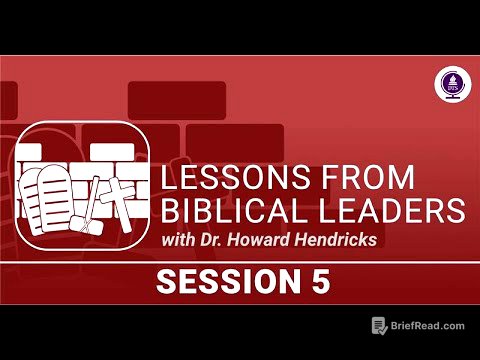TLDR;
This video provides guidelines on understanding and dealing with the signs before the Day of Judgment in Islam. It emphasizes the importance of adhering to the Quran and Sunnah, avoiding speculation, and maintaining a balanced perspective. Key points include continuing good deeds, increasing worship, remaining steadfast, not testing oneself, and acting according to the Prophet's instructions. The video also warns against misinterpretations, making rulings based on signs, and denying signs due to a lack of comprehension.
- Continue doing good deeds and worship Allah more.
- Remain steadfast and don't test yourself.
- Follow the instructions given by the Prophet Muhammad (peace be upon him).
- Be aware of unreliable information and garbage.
Introduction [0:23]
The discussion revolves around the signs before the Day of Judgment, emphasizing the importance of dealing with the unseen with caution. Perfect knowledge and wisdom belong to Allah, and conjecture or guesswork should be avoided. It's crucial to understand the guidelines for interpreting these signs rather than jumping to conclusions or estimations about when the Day of Judgment will occur. Calculating backwards from weak hadith about the 10 major signs being 50 years apart to estimate the Day of Judgment is unreliable.
Guideline 1: Don't Stop Related [2:33]
Continue performing good deeds regardless of the signs appearing. A hadith illustrates this point: even if the Day of Judgment is imminent and one holds a seed, they should still plant it. This emphasizes the importance of continuous good work and living life normally, within reason, irrespective of impending signs.
Guideline 2: Increase in Worship of Allah [4:38]
Increase worship of Allah, especially before trials (fitan) come. A hadith describes trials coming like dark pieces of night, urging people to do good deeds beforehand. During times of fitan, intensifying worship is even more critical. The speaker uses the example of the coronavirus pandemic, noting that instead of intensifying worship, many people turned to entertainment.
Guideline 3: Remain Steadfast [7:44]
Remaining steadfast is crucial when dealing with the signs. Some trials require staying away from society for extended periods. The speaker uses the example of people struggling to remain in their homes during the coronavirus pandemic, despite having access to various forms of entertainment and communication.
Guideline 4: Don't Test Yourself [9:06]
Avoid testing your faith by placing yourself in dangerous situations. Just as one wouldn't intentionally risk damaging something valuable like a phone, one shouldn't test their faith by nearing dangerous or compromising situations. For example, one should not pray with the TV on to test their focus. When the Dajjal emerges, the Prophet Muhammad (peace be upon him) advised running away rather than testing one's faith.
Guideline 5: Behave Based on Instructions [12:06]
Follow the instructions given by the Prophet Muhammad (peace be upon him) on how to behave when specific signs occur. For example, run away from the Dajjal. The Prophet (peace be upon him) provided detailed instructions for specific events, such as the emergence of the Mahdi, which should be followed. Another example is the drying up of the Euphrates River, which will reveal a mountain of gold, but attempting to retrieve it will result in many deaths. Similarly, before the Dajjal's arrival, there will be a severe famine, and people will survive by saying "Subhan Allah."
Guideline 6: Not All Events Will Take Place in Our Times [16:47]
Not all signs have to occur in our time, and we shouldn't interpret every sign as something happening in our current world. People in every era tend to expect the signs to happen in their lifetime. The speaker gives the example of a scholar who was certain the Mahdi would appear during his lifetime. Not everything has to fit our world or happen in our times.
Guideline 7: All Descriptions Have to Match [18:21]
All descriptions of a sign must match. If someone claims to be the Mahdi, they must fit all the descriptions provided in the hadith. The speaker uses the example of someone claiming the TV is the Dajjal because it's in every home and full of lies, but it doesn't match other descriptions of the Dajjal, such as not being able to enter Mecca and Medina. Similarly, claiming that Ya'juj and Ma'juj are already out doesn't match the Quranic description of them being trapped behind a barrier. The speaker also addresses the misconception that the coronavirus is a specific sign of the Day of Judgment, clarifying that while diseases may increase towards the end of times, there is no specific hadith about the coronavirus.
Guidelines for Studying the Signs of the Hour [22:37]
The first guideline is to understand that some signs are detailed, and others are vague, and do not try to fill in the blanks. The second guideline is to gather all the narrations together to get the full picture. The third guideline is that interpretations of authentic narrations can differ.
Guideline 1: Understand Some Signs Are Detailed and Others Are Vague [22:50]
Some signs are detailed, while others are vague, and this is intentional. Do not try to fill in the blanks or meddle with what Allah has kept hidden. The speaker uses the example of the location of Ya'juj and Ma'juj, noting that if we knew their exact location, people would try to interfere.
Guideline 2: Gather All Narrations Together [25:32]
Gather all narrations together to get the full picture. For example, there are numerous hadith about the Dajjal, and putting them all together provides a complete picture. Looking at only one narration without the others can lead to misinterpretations. The speaker uses the example of the Mahdi, noting that if you only know his name is Muhammad Abdullah, you might mistakenly identify someone as the Mahdi.
Guideline 3: Interpretations of Authentic Narrations Can Differ [28:14]
Interpretations of authentic narrations can differ, even among the companions of the Prophet Muhammad (peace be upon him). There can be multiple plausible explanations for a hadith. A red flag should arise if a speaker starts pinpointing exact dates, times, and locations, as this is dealing with the unseen. Anyone who excludes all other plausible explanations and insists on only one interpretation should be viewed with caution.
Guideline 4: Take the Signs Literally [30:10]
For the most part, take the signs literally. When the sun rises from the west, it will literally rise from the west. A beast will come out of the earth, literally. Language should be taken literally unless there is a clear reason to interpret it otherwise.
Guideline 5: You Are Not to Make Rulings Out of the Signs [30:55]
You are not to make rulings based on the signs. For example, we cannot go looking for the Mahdi or appoint a Mahdi. The fact that something is a sign does not necessarily mean it is evil or haram.
Guideline 6: Something Is a Sign, It's Not Necessarily Evil or Haram [31:32]
If something is a sign, it's not necessarily evil or haram. The speaker uses the example of building skyscrapers, which is one of the signs, but it doesn't mean building skyscrapers is haram. Imam Nawawi stated that not everything mentioned as a sign of the hour is prohibited or disparaged.
Guideline 7: The Fact That Something Is From the Signs Is Not a Reason to Create or Initiate It [33:48]
The fact that something is from the signs is not a reason to create or initiate it. The Mahdi is a sign, but that's not a reason to look for him or try to cause him to come sooner. Everything has an appointed time with Allah. The speaker criticizes those who claim to know the exact path that Dhul-Qarnayn took or the exact location of Ya'juj and Ma'juj.
Guideline 8: There Can Be Many Plausible Explanations [35:59]
There can be many plausible explanations, and there can be more than one manifestation of a sign. The speaker uses the example of the hadith that wealth will increase towards the end of time. Some scholars said this happened during the reign of Umar ibn Abd al-Aziz, others said it will happen after the Mahdi comes, and others said it will be after the return of Jesus. All three explanations are plausible.
Guideline 9: Keep the Chronology [38:23]
Keep the chronology, the order of the signs. The speaker criticizes those who claim that Ya'juj and Ma'juj have already come out, as this would mean the other signs that are supposed to happen before them have already occurred.
Guideline 10: Beware the Garbage [39:38]
Beware of unreliable information. Do not deny a sign because you cannot comprehend it. The speaker criticizes an Arabic speaker who dismisses the existence of the Dajjal because he believes time would have taken its toll on him and we would have found him on Google Earth. The speaker argues that Allah is capable of preserving the Dajjal and hiding him from humanity until the appointed time. The speaker warns against being impressed by such garbage.









